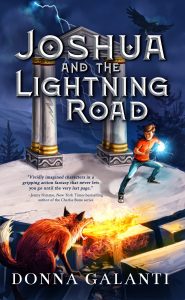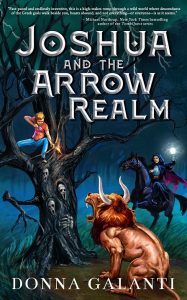With me, my daughter, and my husband all fighting for bandwidth on a DSL line all day, we were running into problems. So we finally broke down and got cable internet. Hopefully the increased bandwidth will erase the problems we’ve been having. We are also keeping the DSL as backup in case our cable goes down, which it seems to do with regularity in our neighborhood. I think I may just stay on the DSL and let them have the cable—the DSL is sufficient for what I need.
I’ve been chipping away at Veritas again this week. I am into the part of the story where serious rebuilding will happen, as the new seeds I planted in the opening bear fruit. So while the general direction of the plot won’t change, how we get there most definitely will. I am trying, among other things, to make my protagonist more active, driving the story more than being pulled along by events. It’s difficult because she is literally trapped in her mind for a significant portion of this section, so having her more active is a bit head-scratching. But I have some ideas to play with.
I know very well that even with all the work I am doing on this editing pass, I will need to do at least one more. Whenever you go in and work on a nearly-complete manuscript and copy, paste, delete, insert, there are going to be continuity issues. So I need to do that, and I need to make sure that all the new stuff hangs together with all the old stuff and that it all makes sense. So still a long way to go, but I am confident I will get there in the end.
Also, I got my ballot in the mail this week, so I am doing a shout-out to everyone to make sure you vote, whether by mail or in person, depending on your state’s procedures. Your vote is your constitutional right and the foundation of our country, so make it count. If you don’t know how or where to vote in your area, call your County Clerk or Board of Elections office, and they will tell you where to go. Make a plan to vote and let your voice be heard!




Power Mad—CoronaLife Day 397
I am researching the Kings of England, after having researched the Kings of Scotland, and I have read about war upon war for power, power, and more power. This seemed especially true of English monarchs. It wasn’t enough to be King of England, you had to also be King of Ireland, and King of Scotland, and, what the heck, King of France. War after war, so much death and destruction because whatever they had, it was never enough.
I admit that I do not understand this mindset. Maybe it’s because I am an introvert and I would never in a million years want to rule all those people, have all those administrative nightmares. Or because I am highly empathetic, and the responsibility for the well-being of all those people would weigh terribly heavy on me.
These people were mad. In two separate cases, a nobleman murdered children to get what he wanted. In 1440, the Regent of Scotland, Crichton, invited the 16-year-old (some sources say he was only 14) Earl of Douglas, William, and his younger brother David, to dinner at his castle—a meal that has come to be known as the Black Dinner. Crichton trumped up charges against them and had them beheaded, in the presence of the distraught 9-year-old King James II of Scotland. This was done as part of a larger power struggle, and many historians believe it was with the full consent of Crichton’s ally, the powerful head of the Douglas family, James the Gross. As James was next in line, he became the 7th Earl of Douglas, and so had much to gain by their deaths.
The better known instance is Richard III of England. When his brother, King Edward IV, died in 1483, Edward’s 12-year-old son Edward became King Edward V. Richard had other ideas, and locked Edward and his 9-year-old brother Richard up in the Tower of London. They were never seen again, and two skeletons found in the Tower in 1674 may have been theirs. Whether they were murdered or simply allowed to die of starvation is not known, but the heinous crime was immortalized in Shakespeare’s Richard III.
I cannot imagine wanted power so much as to murder children. Then again, I cannot see wanting power so much I would start a war, either. So I guess it’s just as well that none of my villains are power-mad. Or maybe my inherent lack of understanding of their nature is why they aren’t. It’s hard to write believable characters if you cannot grasp what makes them tick.
Speaking of writing, both the above stories had satisfying, if not happy, endings. In 1452, King James II of Scotland, now 22 years old, invited James the Gross, Earl of Douglas to dinner. They argued and, in a scene that eerily echoes that of the Black Dinner, King James stabs the Earl to death. King Richard III also did not profit from the deaths of the Princes. Disgust for the murder was a main driver for the nobles to back Henry Tudor, who claimed the crown for himself. Richard III’s reign lasted only 2 years, and the usurper was himself usurped by the incoming Henry VII.
Do you think it’s possible to write believable villains if you yourself don’t understand their emotional and psychological underpinnings?